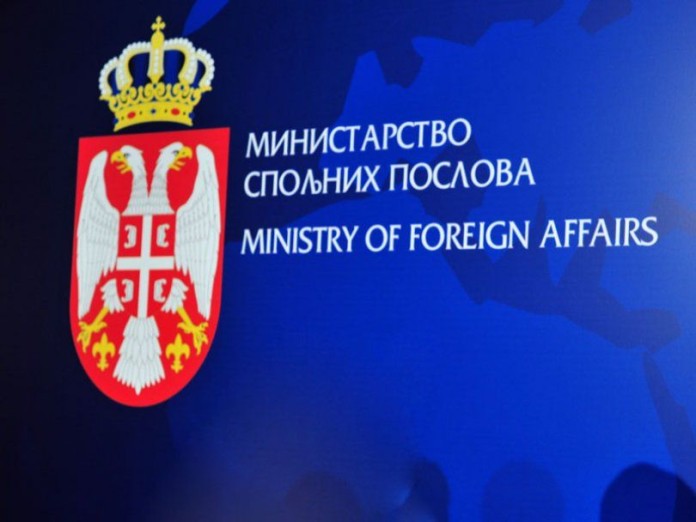Statement by H.E. Ivica Dačić, First Deputy Prime Minister and Minister of Foreign Affairs of the Republic of Serbia at International Conference on the Responsibility of States, Institutions and Individuals in combatting anti-Semitism and anti-Semitic hate crimes in the OSCE area in Rome, Italy:
“Dear Minister Alfano,
Your Excellencies,
Ladies and Gentlemen,
Dear Colleagues,
It is a pleasure and an honour to address you on behalf of the Republic of Serbia on this important occasion. First of all, I would like to thank our Italian hosts for organizing International Conference on the Responsibility of States, Institutions and Individuals in combatting anti-Semitism and anti-Semitic hate crimes in the OSCE area, as well as for the high importance Italy attaches to this topic.
Let me also use this opportunity to congratulate you, Minister Alfano, and your able team for assuming the OSCE Chairmanship and to wish you all success in this challenging endeavour.
Ladies and Gentlemen,
Reflecting on anti-Semitism and anti-Semitic hate crimes is of direct relevance to the security and stability of our societies. I am pleased to see a large number of my colleagues, as well as other high-level representatives of governments present here today. This clearly demonstrates the importance that OSCE participating States attach to combatting anti-Semitism and all forms of intolerance and discrimination.
OSCE has been active in combatting anti-Semitism since 1990, when participating States condemned hate speech and violent attacks targeting Jews and Jewish institutions. This engagement was further enhanced by the adoption of the Berlin Declaration in 2004, where our States condemned all manifestations and attacks motivated by anti-Semitism, as well as committed themselves, inter alia, to combat hate crimes and to promote remembrance and education about the tragedy of the Holocaust.
When we gathered in 2014 on the occasion of the commemoration of the 10th Anniversary of the Berlin Declaration, we underlined that political leadership is key to addressing anti-Semitism effectively. Nowadays when anti-Semitism is taking new forms and expressions, which along with other forms of intolerance and discrimination pose a serious threat to democracy and security, I am convinced more than ever that political leaders have the greatest responsibility in the fight against anti-Semitism.
Ladies and gentlemen,
Combatting all types of extremism and intolerance on national as well as on international level should start by remembrance of the past for (at least) two reasons – it’s our legacy to future generations, but also a lesson about our experiences and their consequences. This is why we find very important to further develop international cooperation on Holocaust education and remembrance in order to prevent the past from being repeated.
The unprecedented character of the Holocaust should always hold universal meaning for us. We must stay committed to remembering and honouring its victims, to upholding the terrible truth of the Holocaust, to standing up against those who distort or deny it and to combatting anti-Semitism, racism and prejudices.
On the occasion of the International Holocaust Remembrance Day (which we are marking on 27th January) we would like to pay tribute to the victims of this tragedy and to reiterate Serbia’s strong condemnation of all forms of racism and xenophobia, including anti-Semitism.
Recognizing the crucial need for a coordinated, international effort on Holocaust-related issues, Serbia actively participates in the work of IHRA International Holocaust Remembrance Alliance as one of its Member States. As stated in the founding document of IHRA -Stockholm Declaration “Our commitment must be to remember the victims who perished, respect the survivors still with us and reaffirm humanity’s common aspiration for mutual understanding und justice”.
Serbia attaches great importance to Holocaust remembrance and education, in order to preserve the memory of the Holocaust as well as to prevent anti-Semitic violence. Since education starts in school, our primary target group is the young generation.
The Serbian Government and the OSCE Office for Democratic Institutions and Human Rights ODIHR agreed to implement teaching materials on anti-Semitism in classrooms across Serbia. Signing this agreement in 2016 was a significant milestone in our combined efforts to counter intolerance and discrimination. Being always a valuable partner to all OSCE Participating States in raising awareness about the challenges anti-Semitism poses for democracy and freedom across the OSCE area, ODIHR has a prominent role in keeping this important topic high on the OSCE agenda.
Allow me, in this context, to underline also the importance of Exhibition “”Jasenovac – the Right to Remembrance”, which I opened in person on 25 January at the UN Headquarters in New York, and which presents the unspeakable suffering of both Serbs and Jews as well as many other peoples, who were stigmatized and subjected to an unprecedented systemic annihilation by the Ustasha regime of the Independent State of Croatia (NDH).
Ladies and Gentlemen,
The past must not be forgotten. We must draw lessons from the past for the future generations in order to overcome prejudices and to avoid mistakes. Particularly we should not lose sight of the fact that in the times of conflicts and crises, the fundamental human rights are the ones the most affected.
At the same time, we have to strive for greater stability, security and prosperity, both within our societies and in relations between our States. Listening our today’s discussion we can feel free to conclude that a comprehensive response is needed to combat anti-Semitism. We firmly believe that OSCE represents a suitable framework for further strengthening of our international effort in fighting this grave and serious phenomenon. The joint efforts in implementation of our commitments represent a key element in safeguarding the stability and security in the OSCE region and beyond.
In closing, let me thank once again our Italian hosts for the warm hospitality they provide us here, in the beautiful city of Rome. I wish you a meaningful and constructive debate.
Thank you for your attention.”








